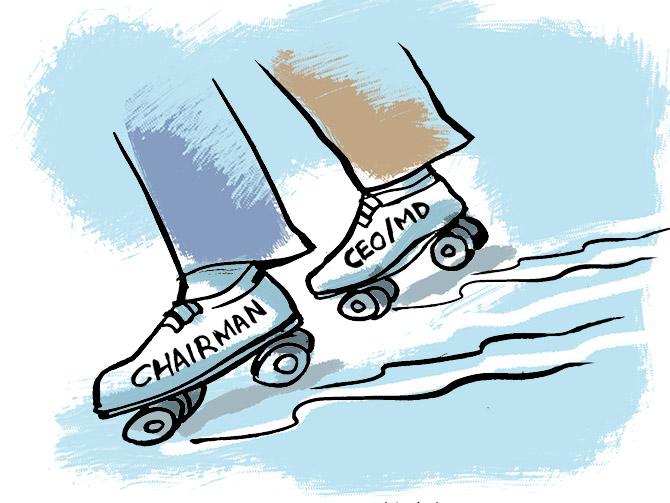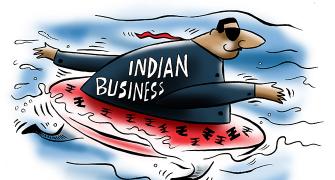If India Inc sincerely feels the separation of posts is not a good governance measure, it must spell out its doubts clearly to Sebi and give cogent arguments rather than mundane ones like India is different, argues J N Gupta, member, Kotak committee on corporate governance reforms.
Illustration: Dominic Xavier/Rediff.com

The Kotak committee on corporate governance reforms, constituted by the Securities and Exchange Board of India, recommended separation of the positions of chairman and CEO/MD.
The logic was the leader of the board should not be the leader of the management, thus providing a better-balanced structure of supervision and management.
The guiding principles of the recommendation were:
- ensuring the board acts independently
- avoiding the risk of concentrating authority in a single individual
- offering role clarity without overlap
- reducing time commitment leading to focussed role play
- choosing the right fit for each role rather than clubbing skill sets
- making the board atmosphere more conducive to debate.
The committee, of which I was a member, had considered international practices and after intense discussion among members, made the recommendations.
Sebi, following its inclusive consultation process, invited public comments and its board took a considered decision and amended the Sebi listing regulations to provide for the separation of the executive position from the chairman's position.
The law is to come into effect from April 1, 2020.
While business performance cannot be predicted, the reaction of India Inc to changes in law can be predicted with 100% certainty.
Any law that puts more money in the pocket (like tax reduction) or reduces compliance or fines is welcome with open arms and implemented immediately.
On the contrary, any law that disturbs the easy calm or status quo, is abhorred.
The opposition to implementing such laws gains momentum as the deadline of implementation nears.
The separation of the CMD position is one such law, opposition to which is gaining momentum as the deadline approaches.
One wonders why that reaction when the law was the result of extensive discussion with all stakeholders.
To me, it appears either India Inc is not convinced about the virtues of good governance or it doesn't agree that separation is a measure of good governance.
What is good governance? Whether separation does mean good governance is a subjective issue.
It is not that Sebi has independently discovered and imported this alien concept.
Much before the law was enacted in India, there was extensive debate all over the world mainly in developed economies on the virtues of separating the two posts resulting in a recommendatory provision with a 'comply or explain' approach adopted in most jurisdiction.
The OECD also recommends that the two positions be separated.
Looking at the recommendatory position in most jurisdiction, one would logically stand behind the demand of India Inc and suggest that the Sebi must also recommend and not legislate.
A perfectly genuine demand.
Unfortunately, copy and paste doesn't work in most Indian situations.
Unlike other jurisdictions, where recommendatory provisions are respected as law, in India implementation requires the force of law with micro prescriptions.
Voluntary guidelines are at the most thesis material for students striving to achieve a doctorate degree, doing statistical analysis of failed voluntary attempts at reform.
If voluntary provisions were indeed adopted by India Inc, many provisions of the law would still be missing from Sebi regulations.
Therefore, if someone is to be blamed for a mandatory provision in place of recommendatory, it is India Inc, whose past performance in adopting voluntary provisions and waiting till the last date to implement a law speaks volumes about its approach towards voluntary guidelines.
The contrast in approach is evident.
As a recommendatory provision -- in cases where the two positions are not separated -- the USA SEC requires an issuer to disclose in the annual proxy sent to investors the reasons why the issuer has chosen...
'(1) the same person to serve as chairman of the board of directors and chief executive officer (or in equivalent positions)'; or '(2) different individuals to serve as chairman of the board of directors and chief executive officer (or in equivalent positions of the issuer)'.
US corporations are adopting the recommendatory guidelines.
An article in The Wall Street Journal ('More US Companies Separating Chief Executive and Chairman Roles', January 23, 2019) reports that in the S&P 500 group, about 60% of the companies had combined the position of CMD in 2007, whereas in 2018, the number came down to 45.6% even though the provision is recommendatory.
In India, even though the provision was made mandatory, most companies adopted a wait and watch till the final day, hoping that the law would be scrapped.
By the end of September 2019, almost 50% of the top 500 listed companies were yet to comply with the law; not surprisingly, almost 80% of PSUs have not separated the posts.
This explains the difference and answers the question why it is mandatory and not recommendatory.
A very strong argument is given against separation -- that it impacts the 'unity of command' and creates two parallel power centres.
On the face of it, the argument looks reasonable; but it lacks depth.
The argument hinges on the assumption that both the board and the management have the same role.
There is a fundamental flaw in the argument.
Any text book on board working would lucidly explain the difference, which may not be as different as chalk and cheese, yet they are not very similar either.
The Cadbury Committee (UK) in the report on corporate governance (1992) noted that 'given the importance and the particular nature of the chairmen's role, it should in principle be separate from that of the chief executive. If the two roles are combined in one person, it represents a considerable concentration of power'.
Another allegation is that Sebi is importing global regulation which may not be suitable to India's culture, history of entrepreneurship and ownership pattern.
Indian corporations are family dominated, with concentrated ownership of promoters -- a reason why a majority shareholder should hand over reins to a person who does not have skin in the game.
This is by far the strongest argument and would find a lot of support.
However, this argument runs against the very concept of a 'corporation' where there are three tiers and each must be separated -- owners, board and the management.
If the owners control the board and the management, it affects the very foundation of a corporation.
And the negative impact of such unity of command outweighs any perceived or actual negative impact of separation.
This probably explains why other jurisdictions have not made the provision mandatory, as most jurisdictions do not have such concentrated family holdings.
Interestingly, whenever the ease of doing business issue is debated, intense criticism is meted out to Indian law makers and at that time the arguments used are 'international practices'.
However, in the same breath if any law implementing best practices from other jurisdiction is proposed, which disturbs the cosy status quo, the argument gets twisted and talks of 'India is different from...' takes centre stage.
It is agreed that good governance is not a science, but an uneven mixture of organisational culture, mindset and ethical values, and therefore the pace of implementation would be different and the impact will also be different.
However, once it is understood that good governance is not meant to please the regulator, but is for the good of all stakeholders and value accretive, there is no reason why steps towards good governance should be delayed.
In case India Inc sincerely feels that the separation of posts is not a good governance measure and not value accretive, it must spell out its doubts clearly to the regulator and give cogent arguments rather than mundane ones like India is different and so on.
Ideally, such arguments must be made prior to the enactment of a law rather than after a law has been notified and the implementation deadline nears.
This puts the regulator in a tricky position.
If the regulator backtracks, it will be accused of either surrendering to pressure or introducing a half-baked law.
Which certainly is not true in this case as an elaborate process of consulting stakeholders was followed by the regulator.
One wonders why a regulator that adopts a transparent and consultative process has to bear so much pressure, whereas many other regulators that do not follow such process face no such pressure.
Don't we want transparency and stakeholder consultation? Theoretically yes, practically no, because we comply only when mandated.
J N Gupta is founder and managing director, Stakeholders Empowerment Services.










